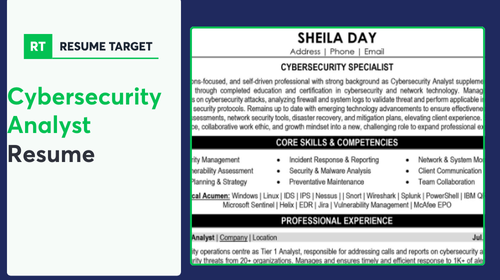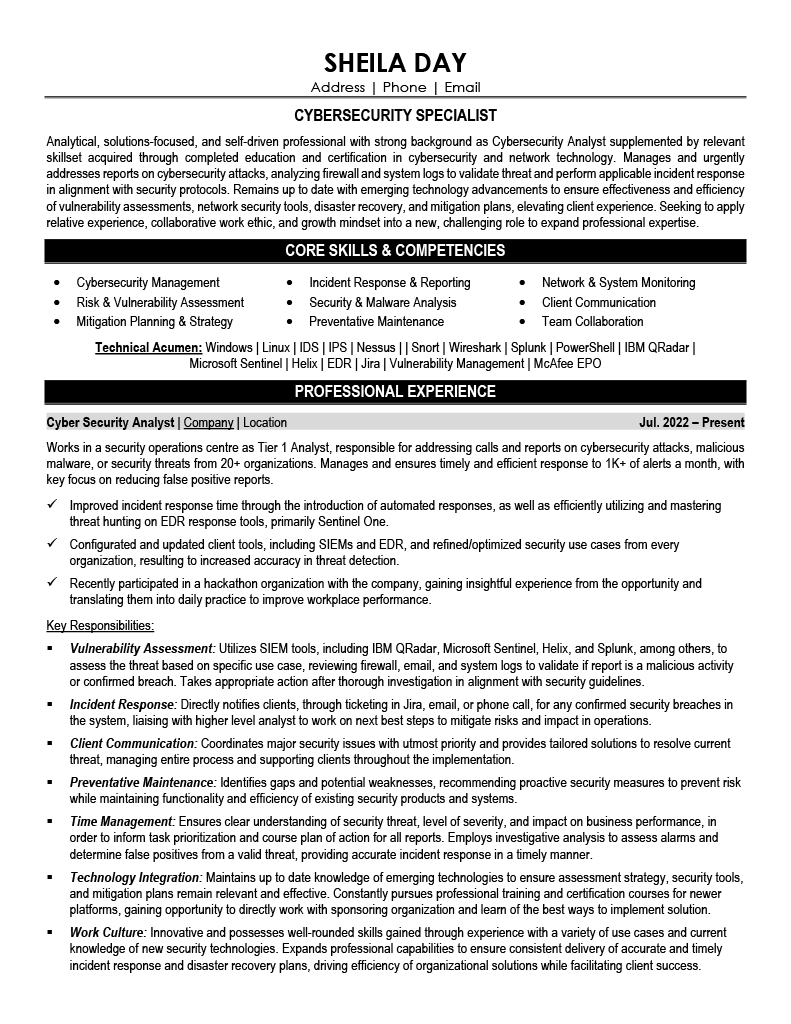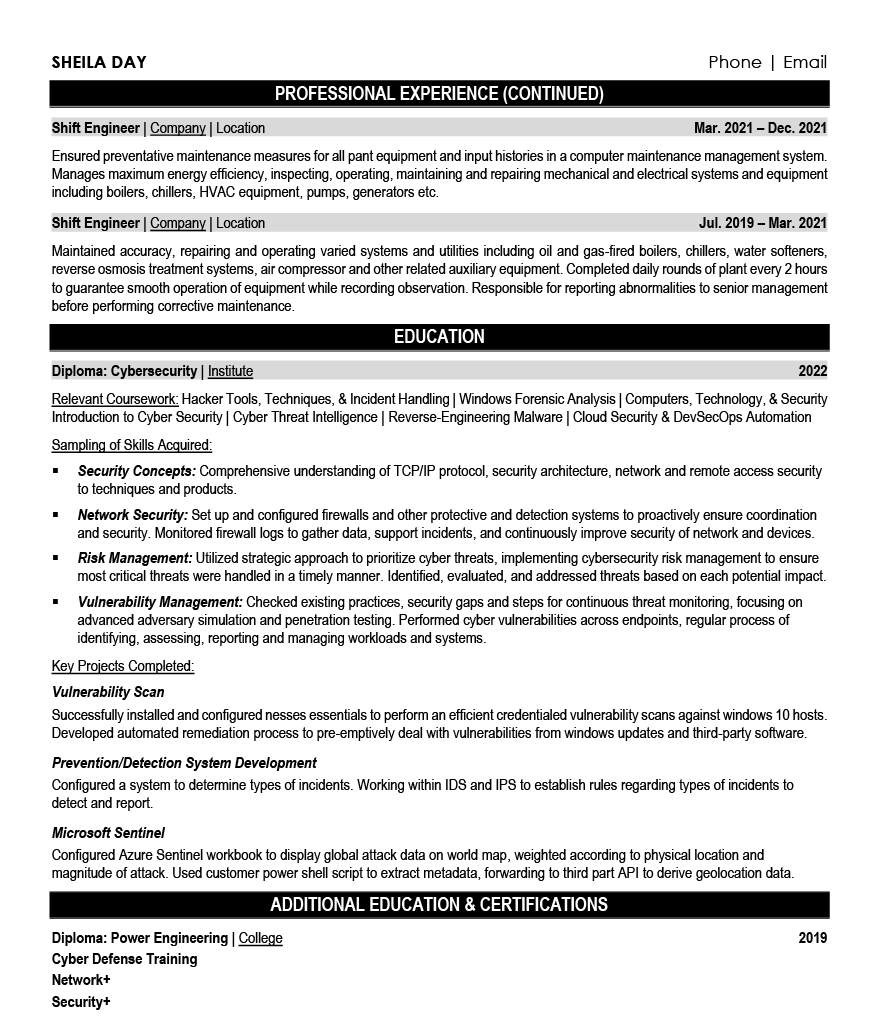

In a world of evolving cyber threats, your technical expertise is only as good as your ability to communicate it. Many cybersecurity analysts have impressive skills but struggle to translate complex technical achievements into compelling resume content.
Are you finding it challenging to showcase your security wins without drowning in technical jargon? Your resume needs to bridge the gap between technical prowess and business value, speaking to both IT leaders and HR professionals.
Resume Target specializes in helping cybersecurity professionals transform their technical expertise into powerful career stories. This guide will show you exactly how to craft a resume that highlights your security achievements and gets you noticed by top employers.


In today's digital battlefield, Cybersecurity Analysts serve as the front-line defenders against an ever-growing array of cyber threats, with employment expected to grow by an impressive 35% through 2031.
Your role as a Cybersecurity Analyst involves monitoring networks for security breaches, implementing robust defense systems through firewalls and encryption, and developing comprehensive security protocols that protect organizations from sophisticated cyber attacks.
Whether you're just starting out or looking to advance your career, the cybersecurity field offers numerous paths for growth, from specialized threat analyst roles to chief information security officer positions, making it an exciting time to join this dynamic and essential profession.
Let's talk about what's exciting in the cybersecurity field! Your career as a Cybersecurity Analyst offers impressive earning potential across various industries, with top opportunities in information technology, finance, and enterprise management. And guess what? Your earning potential grows significantly as you gain experience and specialize in specific security domains.
Figures from: U.S. Bureau of Labor Statistics
Starting as a Cybersecurity Analyst opens doors to exciting growth opportunities, from team leadership to executive security roles. With the right skills and certifications, you can advance to senior positions like Chief Security Officer.
To accelerate your career growth, you'll need to master both technical expertise and leadership capabilities that go beyond basic security skills.
- Programming proficiency (C++, Java, Python) - Network security and protocol expertise - Incident response and threat detection - Strategic communication and team leadershipBreaking into cybersecurity can start with entry-level IT roles, certifications like CompTIA Security+, or specialized bootcamps that build your technical foundation while you gain hands-on experience.
To advance in this field, you'll need to develop key technical competencies including programming experience in languages like C++, PHP, and Java, which will help you transition from entry-level positions to a full security analyst role.
Requirements from Cyberdegrees.org
From Virginia's government contractors to Silicon Valley's tech giants, cybersecurity jobs are booming across diverse sectors.
Figures from U.S. Bureau of Labor Statistics
Struggling to translate your incident response victories, threat detection expertise, and security implementations into a compelling cybersecurity analyst resume that catches a hiring manager's attention? This comprehensive, section-by-section guide will show you exactly how to showcase your technical prowess and security achievements in a format that hiring managers love.
If you're like most cybersecurity professionals, translating your technical expertise into a compelling resume summary can feel more challenging than detecting a sophisticated zero-day threat.
While you excel at protecting networks and analyzing security incidents, showcasing these complex skills to hiring managers requires a different approach - one that quickly demonstrates your ability to safeguard critical assets while speaking to both technical and business impact.
How would you describe your overall approach to threat detection and risk management across your career in cybersecurity?
Reason: This helps frame your high-level security philosophy and strategic mindset, allowing recruiters to quickly understand your fundamental approach to cybersecurity challenges.
What combination of technical expertise and security frameworks have you consistently leveraged to protect organizational assets?
Reason: This question helps articulate your broad technical foundation while highlighting your understanding of standardized security practices, demonstrating both practical and theoretical knowledge.
How would you characterize your role in bridging the gap between technical security measures and business objectives throughout your career?
Reason: This helps showcase your ability to translate complex security concepts into business value, a critical skill that distinguishes senior security analysts from purely technical practitioners.
As a cybersecurity analyst, you need to showcase both your technical expertise in threat detection and incident response, as well as your ability to handle day-to-day security operations and compliance tasks.
Your skills section should demonstrate your proficiency with security tools and frameworks while also highlighting critical soft skills like problem-solving and communication that employers consistently seek in security professionals.
Showcase your cybersecurity expertise by organizing your work history into three powerful sections: a high-level role overview that establishes your security focus, quantifiable achievements that demonstrate your threat detection wins, and core responsibilities that highlight your technical and analytical capabilities.
Many Cybersecurity Analysts struggle to translate their technical defensive actions and incident responses into clear business value for hiring managers. Transform your security metrics into compelling achievements by connecting threat mitigation efforts directly to protected assets, reduced vulnerabilities, and strengthened organizational security posture.
A strong responsibilities section demonstrates how Cybersecurity Analysts protect digital assets and maintain network security beyond basic monitoring tasks. Your role description should translate technical security operations into clear achievements that show executives and recruiters how you contribute to organizational risk management and data protection.
Your cybersecurity credentials demonstrate your expertise in threat detection, incident response, and security best practices. Lead with your most advanced technical certifications and relevant degrees, especially those focused on information security, network defense, and security operations.
Now that you've built a strong foundation following Resume Target's expert guidelines, you have an impressive base resume ready for customization.
While many cybersecurity professionals focus solely on tailoring their cover letters, customizing your actual resume for each specific security role is what truly sets successful candidates apart in this competitive field.
Strategic resume customization not only helps you bypass sophisticated ATS systems by incorporating the right security-focused keywords, but it also demonstrates to hiring managers that your specific technical skills and cyber defense experience align perfectly with their security needs and challenges.
Ready to turn your resume into your most powerful tool? Let's transform your cybersecurity credentials into a targeted presentation that makes hiring managers say "This is exactly who we need to protect our systems!"
Don't let a lack of professional experience hold you back from launching your career as a Cybersecurity Analyst!
Your resume can showcase your potential through relevant coursework, technical certifications, and hands-on projects or lab experience that demonstrate your ability to protect digital assets.
Focus on highlighting your technical skills, security fundamentals knowledge, and any practical experience from academic projects or internships.
For more detailed guidance on structuring your entry-level resume, check out the Student Resume Writing Guide to ensure you're presenting your qualifications effectively.
Your resume summary is your chance to showcase your cybersecurity education, certifications, and hands-on lab experience that make you an excellent candidate for this role.
Focus on highlighting your technical skills, security projects, and passionate commitment to protecting digital assets, even if you're just starting your professional journey.
"Detail-oriented and security-focused professional with comprehensive training in cybersecurity fundamentals and network defense systems. Proficient in vulnerability assessment tools, intrusion detection systems, and security information and event management (SIEM) platforms through academic projects and hands-on lab work. Completed Security+ certification and contributed to university cybersecurity club initiatives. Seeking to leverage strong analytical skills and security knowledge to protect organizational assets as a Cybersecurity Analyst while growing into an InfoSec expert."
Now's your chance to showcase the specialized cybersecurity training and technical certifications that make you stand out in this rapidly evolving field!
Transform your educational background into compelling content by highlighting relevant coursework like "Network Security Fundamentals"or "Ethical Hacking,"along with hands-on projects that demonstrate your practical security analysis skills.
Insufficient data available despite thorough search to identify courses common to all Cybersecurity Analyst degrees/certifications. However, the IBM Cybersecurity Analyst Professional Certificate includes courses on cybersecurity essentials, tools, and technologies; cyberattacks; operating systems; networking fundamentals; database fundamentals and vulnerabilities; cybersecurity architecture; compliance frameworks; standards and regulations; and penetration testing, incident response, forensics, and threat intelligence.Relevant Coursework: Cybersecurity Essentials | Network Security Fundamentals | Operating Systems Security | Database Security | Incident Response | Penetration Testing
Key Projects:
Network Security Assessment Project: Conducted comprehensive security audit of campus network infrastructure to identify vulnerabilities and implement defense strategies. Developed and presented detailed remediation plan to IT department.
Security Incident Response Simulation: Led team of four students in developing and executing incident response plan for simulated ransomware attack scenario.
Transform your academic knowledge, certification training, and hands-on technical experience into a powerful skills section that showcases your readiness to protect organizational assets and combat cyber threats.
As an entry-level Cybersecurity Analyst, your combination of technical skills and security fundamentals positions you well for a field that continues to experience tremendous growth and offers extensive opportunities for professional advancement.
Let's face it - trying to explain your complex security implementations and threat detection wins on paper feels like trying to compress a terabyte of data into a kilobyte file.
At Resume Target, we specialize in translating intricate cybersecurity achievements into powerful career stories that hiring managers actually understand.
Our expert writers have helped countless security professionals showcase their SOC experience, incident response victories, and technical expertise in ways that make them stand out in today's competitive IT landscape.
With cyber threats evolving daily and companies desperately seeking top security talent, now is the perfect time to transform your resume into a powerful tool - let's connect for a free consultation today.
Impress any hiring manager with our IT resume writing service. We work with all career levels and types of IT professionals.
Learn More → IT Resume Writing Services